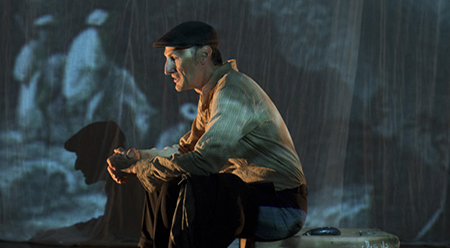 Travelling in Asia in the 1990s, David Joseph’s exposure to the living tradition of ancestor worship inspired him to find a way to honour his own family’s history. The result, co-devised with director Karen Berger, is Deceptive Threads – a theatrical excavation of secrets from the lives of his two grandfathers.
Travelling in Asia in the 1990s, David Joseph’s exposure to the living tradition of ancestor worship inspired him to find a way to honour his own family’s history. The result, co-devised with director Karen Berger, is Deceptive Threads – a theatrical excavation of secrets from the lives of his two grandfathers.
We begin the investigation with a little overview of the origins of Joseph’s Lebanese grandfather. Following a long ship voyage, an uncomprehending Australian immigration official anglicised his name to Elias Joseph. Like it or not, his assimilation had begun.
Deceptive Threads employed a variety of multimedia projections, designed by Zoe Scoglio and Hisham Tawfiqi. In discussing grandfather Elias, these, combined with Bronwyn Pringle’s lighting design, were put to particularly poetic use; ripples across a screen brought forth the uncertainty of the unknown in journeying to a new land.
However, sometimes Deceptive Threads suffered from a flaw seen in other multimedia productions of using graphics just because it can. At times, images were either incongruously jokey for the scene, or swirling text snippets distracted from Joseph’s storytelling.
We’re on firmer ground with the detective story itself as the work took on elements of documentary theatre. Inconsistencies between what’s known of paternal grandfather’s history and his naturalisation forms revealed another layer of the mystery. Newspapers from around the turn of the 20th century showed an Australian history of racial discrimination we are still unable to outgrow.
The Norwegian origins of maternal grandfather Fred Ommundson didn’t feature so much in his story. Even so, Fred’s life had a few twists, from Tivoli singer in a barbershop quartet to spymaster for the Australian government, supposedly having a role in vetting potential immigrants. It was unfortunate that the files on Fred’s service are still classified. Lacking these details, the telling of Fred’s story seemed somewhat padded at times.
While there was some effort to draw a connection between Joseph’s two grandfathers, the common threads were a bit thin. I found the story of Elias to be much stronger. Further, it better suited the show’s framing as a consideration of remnants of family history preserved in a new country.
Given the subject matter, considering the attitudes of today’s Australian government seems entirely appropriate. As for some other recent works with aspirations towards political comment, Deceptive Threads let itself down here. To make the connection, it merely relied on projected images of Federal parliamentarians; Senator Pauline Hanson and Immigration Minister Peter Dutton.
What can such an obvious treatment hope to contribute to debates around asylum seekers and migration? Maybe I wouldn’t have been quite so irritated by the superficiality of this tactic if we hadn’t just seen an event the media assured us was virtually impossible; ‘President-Elect Trump’.
This shows us that, despite the best of intentions, liberal-minded people ridiculing ‘conservative’ figures and policies amongst themselves – whether on Saturday Night Live or in local theatre – is not making a meaningful contribution to wider political discourse. To paraphrase one of countless post-mortem political opinion pieces from the last few days, when we think we’re part of the ‘sensible centre’, it’s a shock to realise we’re actually part of an urban elite.
Whilst it may suit us to anaesthetise our gnawing concerns about Australia through theatre that reflects our values, Pauline Hanson’s One Nation party received around 593 000 senate votes in the 2016 election.
The rise of isolationist or nationalist parties around the world in recent times gives some insight into the frustrations of voters, including Australians. At least some are concerned that immigration will further push up the price of scarce housing. They bemoan that ‘Big Australia’ has made our cities crowded and less liveable, and worry about dying industries and disappearing jobs. At the very least they want their concerns acknowledged, and elites who fail to do this only drive the disaffected towards someone who will. Belatedly, Australian political parties are starting to get it.
Now, surely, it’s time for the arts community to also rethink its role in today’s Australia. Rather than assuming audiences see left-wing values as axiomatic truth, it could make an argument for these values. For one example, the arts could tell stories that show us how migration has enriched our country. Further, maybe companies need to engage with schools more, or travel beyond the inner-city of east-coast capitals to engage those who would not – or cannot – typically attend theatre.
Disappointments aside, Joseph is a well-rounded performer with talent in presenting traditional music, maintaining an accent, and balancing some comedic and dramatic elements in an unconventional narrative style. Deceptive Threads is particularly strong as a personal reflection on family ties and a historical overview of Australia’s racist policies.
Deceptive Threads
fortyfivedownstairs, 45 Flinders Lane, Melbourne
Performance: Thursday 10 November 2016 – 7.30pm
Season continues to 20 November 2016
Bookings: www.fortyfivedownstairs.com
For more information, visit: www.bowerbirdtheatre.com for details.
Image: David Joseph features in Deceptive Threads – photo by Ponch Hawkes
Review: Jason Whyte
